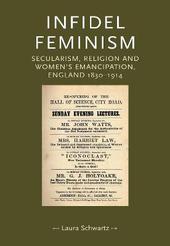
|
Infidel Feminism: Secularism, Religion and Women's Emancipation, England 1830-1914
Paperback / softback
Main Details
| Title |
Infidel Feminism: Secularism, Religion and Women's Emancipation, England 1830-1914
|
| Authors and Contributors |
By (author) Laura Schwarz
|
| Series | Gender in History |
|---|
| Physical Properties |
| Format:Paperback / softback | | Pages:264 | | Dimensions(mm): Height 216,Width 138 |
|
| Category/Genre | British and Irish History
Humanist and secular alternatives to religion |
|---|
| ISBN/Barcode |
9780719097287
|
| Classifications | Dewey:305.420941 |
|---|
| Audience | | Tertiary Education (US: College) | | Professional & Vocational | |
|---|
| Illustrations |
Halftones, black & white
|
|
Publishing Details |
| Publisher |
Manchester University Press
|
| Imprint |
Manchester University Press
|
| Publication Date |
1 March 2015 |
| Publication Country |
United Kingdom
|
Description
The first in-depth study of a distinctive brand of women's rights that emerged out of the Victorian Secularist movement. It looks at the lives and work of a number of female activists, whose renunciation of religion shaped their struggle for emancipation. Anti-religious or secular ideas were fundamental to the development of feminist thought. -- .
Author Biography
Laura Schwartz is Assistant Professor of Modern British History at the University of Warwick -- .
ReviewsAn illuminating read'. June Purvis, THE, 21st March 2013 "In sum, this book is a fascinating read, and a rigorously written history of a radical women's movement. As such, it merits reading, and inclusion into our studies of feminism and women's movement in Victorian times." (Sneha Krishnan, Wolfson College, Oxford, LSE Reviews, 20/11/2013) "Infidel Feminists makes an important, thorough and very compelling contribution to our understanding of the richness and diversity of both religious culture and feminism in the nineteenth and early twentieth century." (Alison Twells, Sheffield Hallam, Women's History Review, 03/10/2013) "This important work is long overdue" (Dr Edward Royle, University of York, Reviews in History, 14/11/2013) Infidel Feminism establishes with great clarity the significance of this 'substratum of feminist identity' to the wider Victorian women's movement...As such it deserves to gain an appreciative audience amongst both scholars of Victorian feminism and historians of Victorian religion. ...it deserves to gain an appreciative audience amongst both scholars of Victorian feminism and historians of Victorian religion. -- .
|